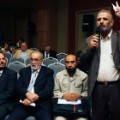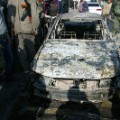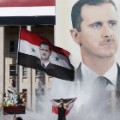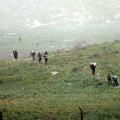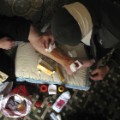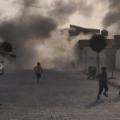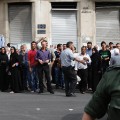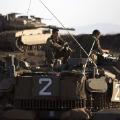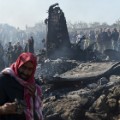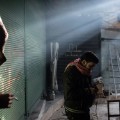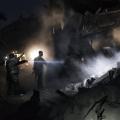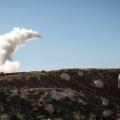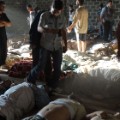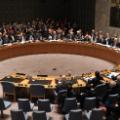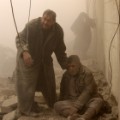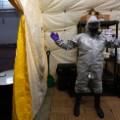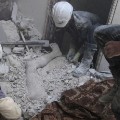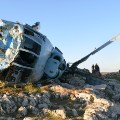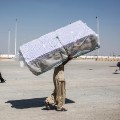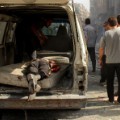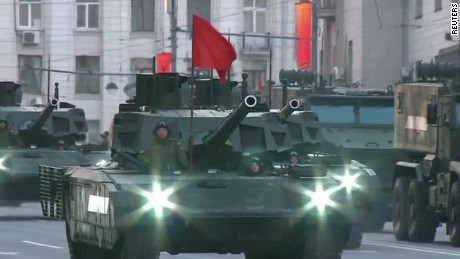Story highlights
- John McCain: White House floundering in response to Russia's Syria moves
- This is America's last opportunity to make a difference in Syria, he says
John McCain, R-Arizona, is a U.S. senator and chairman of the Senate Committee on Armed Services. The views expressed are his own.
(CNN)Russia's military intervention in Syria on behalf of President Bashar al-Assad is the latest disastrous turn in the Middle East under the Obama administration -- and another humiliating setback for the United States. But as in past crises, the White House is once again floundering.
Just consider: A few weeks ago, the administration warned Russia not to send its forces to Syria. Russia did it anyway. The administration then tried to block Russia's access to airspace en route to Syria. It failed. The consequence? President Barack Obama acquiesced to his first formal meeting in two years with Russian President Vladimir Putin. U.S. defense officials rushed into talks with Russia's military to "de-conflict" in Syria. And Secretary of State John Kerry called Russia's actions an "opportunity" to cooperate because we agree on "fundamental principles."
How did Putin respond? By bombing U.S.-backed opposition groups in Syria.
President Obama is fond of saying there is no military solution to this or any other crisis. This ignores the reality that there is a major military dimension to the problem, and it is getting worse each day. It also ignores history: Most civil wars actually do end when one side wins and the other loses. That is Putin's military solution, and he is now imposing it with Russian airpower and an anti-American coalition of Syrian, Iranian and Hezbollah ground forces. Russian troops will likely take the field with them. And Putin may then expand these operations into Iraq.
However this conflict ends, it must not involve Putin shoring up his partners, crushing ours, destroying our remaining credibility in the Middle East, and restoring Russia as a major power in this vital region. Vladimir Putin must be stopped, not least because he will inflame every aspect of this conflict in the process: the refugee crisis, the mass atrocities and the growth of ISIS.
There is an opportunity here, but the opposite of what Kerry suggested. It is an opportunity to impose significant costs on an adversary that wants to undercut the United States everywhere. It is an opportunity to weaken an anti-American ruler who will always view us as an enemy. And it is an opportunity to rebuild U.S. credibility and influence in the Middle East by taking actions, as only we can, to arrest the spread of a regional conflict that is an incubator of global terrorism.
We cannot shy away from confronting Russia in Syria, as Putin expects the administration will do. His intervention has raised the costs and risks of greater U.S. involvement in Syria, but it has not negated the steps we need to take. Indeed, it has made them more imperative.
We must act now to defend civilian populations and our opposition partners in Syria. As Gen. David Petraeus and others have advocated, we must establish enclaves in Syria where civilians and the moderate opposition to Syrian leader Bashar al-Assad and ISIS can find greater security. These enclaves must be protected with greater American and coalition airpower and likely foreign troops on the ground. We should not rule out that U.S. forces could play a limited role in this ground contingent. If al-Assad continues to barrel bomb civilians in Syria, we should destroy his air force's ability to operate.
We must back up our policy in ways that check Putin's ambitions and shape his behavior. If Russia attacks our opposition partners, we must impose greater costs on Russia's interests -- for example, by striking significant Syrian leadership or military targets.
But we should not confine our response to Syria. We must increase pressure on Russia elsewhere. We should provide defensive weapons and related assistance to Ukrainian forces so they can take a greater toll on Russian forces. To weaken Putin at home and abroad, we should make more information public about the corruption of the Russian leadership, including the president himself, and how Russia uses graft as a tool of state policy. And if Putin continues to strike Syrian civilians and our opposition partners, we should ramp up targeted sanctions on Russia. Low energy prices are battering Russia's economy and currency. We should increase that pain.
The United States must lead these efforts with the broadest possible coalition. We will find many willing partners in Europe, which is reeling from the refugee crisis, as well as the Sunni Arab states, which will view a Russian victory in Syria as an Iranian victory. Rather than play into Putin's hands by undermining our own international efforts to isolate him, we should enhance those efforts to deepen that isolation and balance against Russia.
President Obama thinks Syria will be a "quagmire" for Russia. Perhaps. But the last time Russia faced a quagmire, America had something to do with it. That response was begun by a Democratic president who finally realized late in his administration that his policy was failing and he needed to change course. President Obama could learn a lot from President Jimmy Carter, and he should. This is America's last opportunity to make a difference in Syria and avert a strategic disaster that now threatens the global balance of power. We cannot afford to squander it.
Join us on Facebook.com/CNNOpinion.
Read CNNOpinion's Flipboard magazine.


 U.S.
U.S. Español
Español Arabic
Arabic























































